Like many people, each time NATO approaches a big birthday the institution and those close to it experience a certain amount of existential angst. And no decision has inspired more intellectual hand-wringing than the enlargement of NATO to include former Eastern Bloc countries.
The Baltic states are the most frequent targets, as critics argue that Russian local military superiority and the ability to deny NATO operational access make them indefensible. In the event of a Russian incursion, they say, the Baltic states would be defeated before the North Atlantic Council could meet to invoke Article 5 of the Washington Treaty.
NATO’s newest Allies from the former Yugoslavia—Croatia, and particularly Albania and Montenegro—have also faced questions about their ability to contribute military to the alliance, given their small size. How, critics ask, can a country of 600,000 people like Montenegro contribute to the collective defense of a 29-country alliance covering more than 800 million people?
There are seeds of truth in these criticisms, and there is ample room for reform—to speed up NATO’s crisis decisionmaking, to further improve the NATO response force, and yes, to ensure more equitable burdensharing.
NATO is the most successful military alliance in the history of the world.
But these arguments miss the point. NATO is the most successful military alliance in the history of the world. But what sets it apart is not the military might of its members, most of all the United States. What makes NATO special, and what has allowed it to grow and prosper for the last 70 years despite dramatic geopolitical change, is an idea.
At NATO’s founding, as the shadow of Communism fell across what became known as the Eastern Bloc, that idea was to “safeguard the freedom, common heritage, and civilization of [Allied] peoples, founded on the principles of democracy, individual liberty, and the rule of law.” As the Cold War drew to a close in 1989, President George H.W. Bush simplified that idea to “a Europe whole and free.”
And so, as the Iron Curtain fell, NATO opened its doors to countries that chose to embrace democracy, individual liberty, and the rule of law, and to embark on difficult reforms to transform their militaries, their economies, and their societies.
With each successive wave of enlargement—beginning with the Czech Republic, Hungary, and Poland 20 years ago, through Montenegro’s accession in 2017—the vision of a Europe whole and free has come into clearer focus. And it should soon become clearer still.
Last year’s historic Prespa Agreement solved the decade-long dispute between Greece and the Former Yugoslav Republic of Macedonia over the latter’s name, which since 2007 had blocked the country’s progress toward NATO and EU membership. Now the newly renamed North Macedonia stands ready to walk through NATO’s open door. All that remains is for all 29 NATO allies to ratify the instruments of accession.
In the United States, that means the Senate must provide advice and consent, and the president must sign the accession protocols. It should be a no-brainer, since the name issue is all that has stood in the way of North Macedonia’s membership in NATO for more than a decade.
However, there are sure to be detractors in the Senate, and perhaps even in the White House. They may point to the Baltic states, or Montenegro, and ask what an ally with a population of only 2 million can bring to the alliance.
The answer is simple. The people of North Macedonia believe NATO membership is so important to the future of their country that they were willing to change its name.
That is the power of the idea of NATO—the allure of a Europe whole and free, comprised of like-minded democracies committed to securing not just their borders, but also their values. This is not just a rallying cry, but a mighty weapon in and of itself.
NATO possesses a powerful military deterrent, but its political deterrent is more powerful still. The Baltic states, for all their vulnerability to a Russian incursion, have no territory occupied by Russian troops. This stands in stark contrast to the other former Soviet republics that have turned toward the West—Ukraine, Georgia, and Moldova—whose territorial integrity Russia continues to violate in order to stymy their Euro-Atlantic aspirations.
As we face an era of renewed great power competition, with a revanchist Russia and an emerging China seeking to remake the international system in their own interest, the idea of NATO has never been more important. As President George H.W. Bush said in his 1989 speech entitled “Europe Whole and Free”: “The foundation of lasting security comes not from tanks, troops, or barbed wire; it is built on shared values and agreements that link free peoples.”
NATO is the foundation for lasting security in Europe. A Europe whole and free remains the goal. And the open door must remain open to all that share our values, undertake the commitments and obligations of membership, and contribute to the security of the Euro-Atlantic area, beginning with North Macedonia.

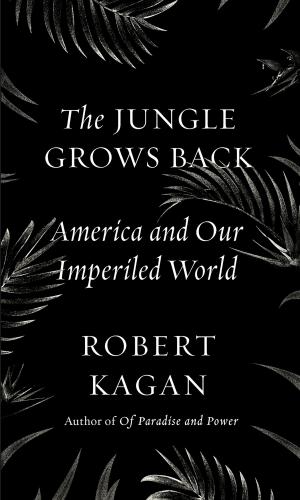
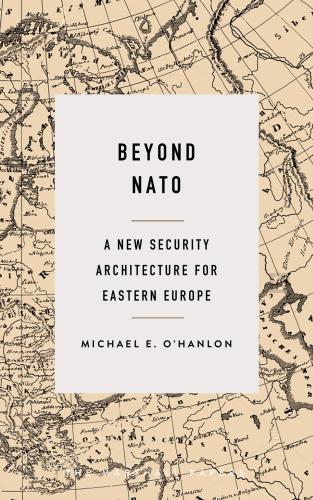
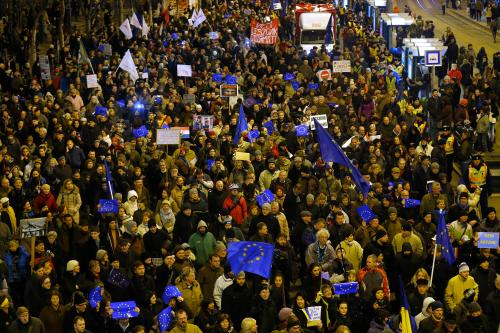
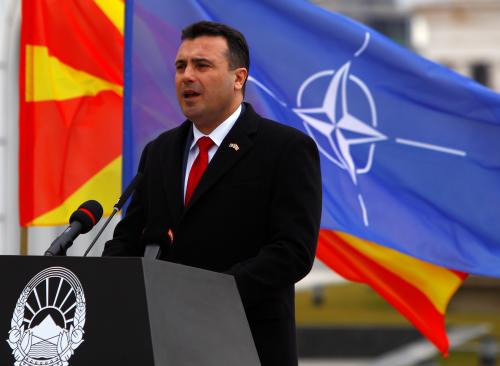



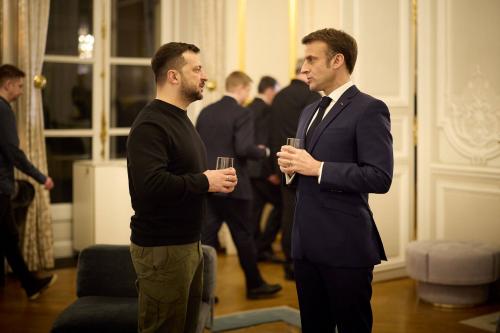
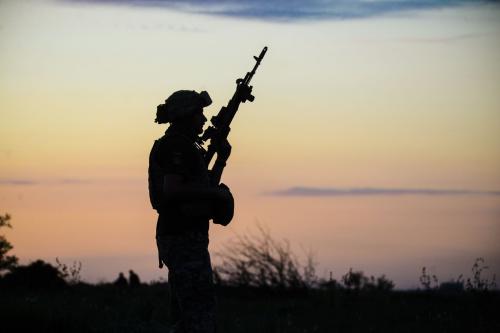
Commentary
Europe whole and free: Why NATO’s open door must remain open
April 3, 2019